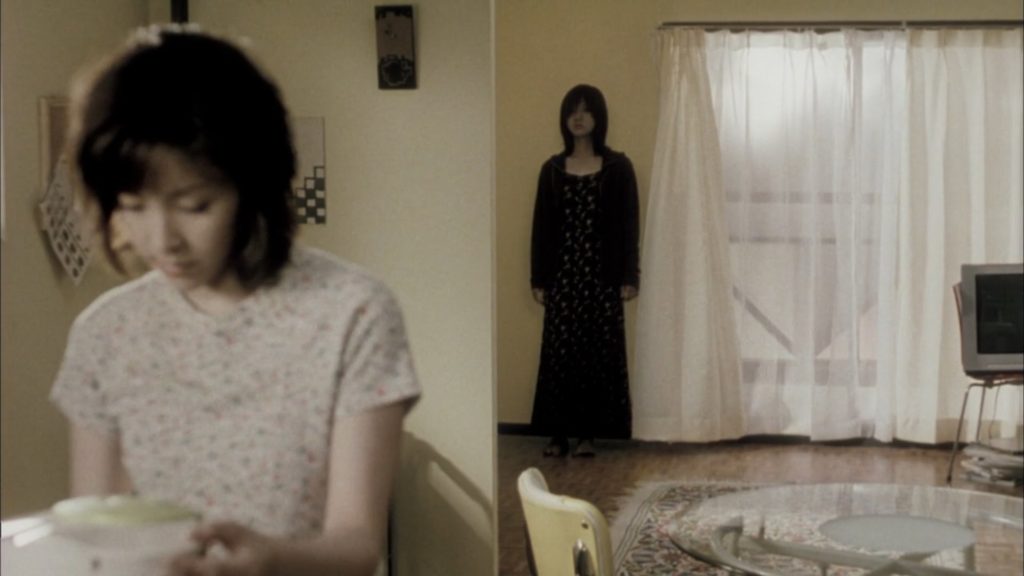
Here at Latent Images, we are passionate about leading student discussions on film and media. As part of a new ongoing series, each month we will be highlighting a different selection of favorites from our team of staff writers and contributors. Monthly selections will alternate, varying on different kinds of topics — from actors, to film scores, to noteworthy moments — giving students the space to discuss, recommend, and praise as they please.
In honor of Pi day, March’s staff favorites are films that all contain a math or STEM focus at their core. From documentaries about the Apollo missions to Japanese horror classics about the nascent internet era, these selections display films that capture the social, emotional, and historical relevance of history’s scientific advancements and leaders.

For All Mankind, 1989, dir. Al Reinert, United States
Through the use of archival footage from the Apollo missions, Al Reinert crafts a beautiful vision of the stars. For All Mankind explores the Apollo astronauts as they ponder the stars and our planet’s place in the universe. Through narration each astronaut tells their story of how they know nothing so humbling, nothing so beautiful as the vastness of space. Through the Apollo astronauts’ 16mm footage, the viewer comes to understand what they mean. After 80 minutes of a heartbreaking Brian Eno score and the direction of Reinert, the film begins to only explore what will be the future of space exploration. In the span of four years, humankind had been to the moon six times and with each trip our existence became more minuscule. The Brian Eno score helps the film transcend beyond our small and insignificant planet Earth. Reinert ends the film with a dedication to “the men and women who have given their lives in the exploration of Space”. For All Mankind is a living, heartbreaking document of Earth’s early travels into space and into the lonely emptiness that lies ahead. – Aidan Collins
For All Mankind is available to stream on HBO Max and The Criterion Channel

Pulse, 2001, Dir. 2001, Kiyoshi Kurosawa, Japan
A response to the new millennium panic, Pulse is a cry of fear distant yet echoing. Centering around a series of strange deaths in a pre-internet Tokyo, the first half of Pulse can seem like a deceptively simple ghost tale. Then, in all its achromatic gloom and post-industrial decay, the film reveals itself to be a somber discourse on technology at its most unheimlich. Often overlooked in comparison to Kiyoshi’s masterful employment of shadows and space, the true brilliance of Pulse is found in its prophetic vision – After being ravaged by a global pandemic, we have never been more anguished by isolation; in retrospective, the world that Pulse created – a world doomed by human’s collective escape into cyberspace to avoid alienation in reality – feels no less than an oracle. – Richard Zheng
Pulse is available to stream on Pluto, YouTube, Crackle, and Vudu for free. It is also available with a Prime Video or Philo subscription and can be rented or purchased on most digital vendors.

Hidden Figures, 2016, Dir. Theodore Melfi, United States
Melfi’s Hidden Figures follows the real story of three brilliant African American women and their journeys through NASA in the 1960s, helping launch astronaut John Glenn into orbit. The stories of Katherine Johnson, Dorothy Vaughen, and Mary Jackson were all vital to changing the tides of the Space Race, as well as the ways in which NASA treats African Americans and women as a whole. The film does an excellent job at exploring the characters’ intersectionality of two groups that have often been repressed and neglected in society; women and African Americans. Perfect for Women’s History Month, Hidden Figures takes a deep dive into the bravery of each woman, as well as their ingenious and life-changing work. – Molly Kurpis
Hidden Figures can be streamed on tubi and Disney+. It is also available for rent or purchase on most digital vendors.

Aphotic Zone, 2022, Dir. Emilija Škarnulytė, Lithuania, Italy
In the great depths of a body of water, where little to no sunlight can light what lies beneath, is the aphotic zone. Lithuanian documentarian and artist Emilija Škarnulytė dives 4 km below the surface of the Gulf of Mexico, where bioluminescent organisms illuminate the ocean floor, in her 16-minute-long film Aphotic Zone (2022). Here, marine scientists seek to discover a species of coral that might have the strength to survive the increasing temperatures and acidification of the ocean. This poetic documentary explores this dark and otherworldly environment through high-definition visuals coupled with a stunningly disarming soundscape. Through illuminating images of otherworldly creatures and underwater machinery, she sheds light on the ecological collapse that results from industrial pollution, and the scientific efforts being made to survive this rapid destruction. Aphotic Zone will leave you in awe with its spectacle all along compelling you to look deeper into the impacts industrialization and greed have on such a precious environment. – Julia Cross
Aphotic Zone is available to stream on Mubi.